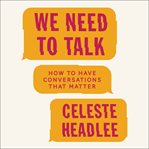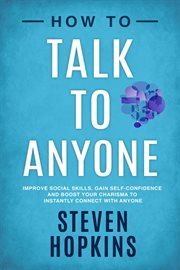We need to talk How to have conversations that matter
eAudio - 2017
WE NEED TO TALK. They are, perhaps, the most dreaded four words in the English language. But in her timely, insightful, and wonderfully practical audiobook, We Need to Talk, Celeste Headlee who earns a living by talking on the airwaves of National Public Radio makes the case that they are urgently needed. Today most of us communicate from behind electronic screens, and studies show that Americans feel less connected and more divided than ever before. The blame for some of this disconnect can be attributed to our political landscape, but the erosion of our conversational skills as a society lies with us as individuals. And the only way forward, says Headlee, is to start talking to each other. In We Need to Talk, she outlines the strategies t...hat have made her a better conversationalist and offers simple tools that can improve anyone's communication. For example, BE THERE OR GO ELSEWHERE. Human beings are incapable of multitasking, and this is especially true of tasks that involve language. Think you can type up a few emails while on a business call, or hold a conversation with your child while texting your spouse? Think again. The belief that your intelligence protects you from erroneous assumptions can end up making you more vulnerable to them. We all have blind spots that affect the way we view others. Check your bias before you judge someone else. HIDE YOUR PHONE. Don't just put down your phone, put it away. New research suggests that the mere presence of a cell phone can negatively impact the quality of a conversation. Whether you're struggling to communicate with your kid's teacher at school, an employee at work, or the people you love the most. Headlee offers smart strategies that can help us all have conversations that matter.
- Subjects
- Published
-
[United States] :
HarperAudio
2017.
- Language
- English
- Corporate Author
- Main Author
- Corporate Author
- Other Authors
- Edition
- Unabridged
- Online Access
- Instantly available on hoopla.
Cover image - Physical Description
- 1 online resource (1 audio file (5hr., 11 min.)) : digital
- Format
- Mode of access: World Wide Web.
- ISBN
- 9780062695260
- Access
- AVAILABLE FOR USE ONLY BY IOWA CITY AND RESIDENTS OF THE CONTRACTING GOVERNMENTS OF JOHNSON COUNTY, UNIVERSITY HEIGHTS, HILLS, AND LONE TREE (IA).
Review by Kirkus Book Review


